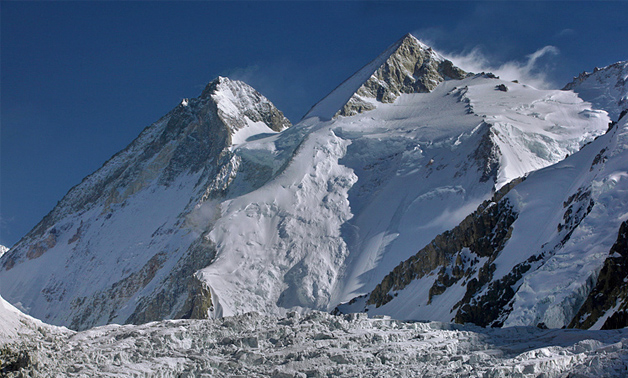Gasherbrum II (8035 m) is also known as The Shining Wall. It was first climbed in 1956 by the Austrian Karakoram expedition, led by Fritz Moravec. From Concordia, it is a day walk to the base camp of G 2. There are six peaks in the Gashabrum series. G 1 & 2 are above 8000 meters and the other 4 our less than 8000 meters.
For more information on the Gasherbrum II (8035 m) and the Expeditions that we run there, contact us via:
WhatsApp: +92 347 4598096 | +92 345 4354348
Email: info@rockvalleytours.com
Departure For Pakistan.
Spend the day in Islamabad finalizing permit details with the Ministry of Tourism. Evening free. Overnight at hotel.
In the morning you will be transferred to Islamabad Airport for the flight to Skardu (2272m). This flight is subject to clear weather. Alternately, we take a two-day drive to Skardu, along the Karakoram Highway, sometimes referred to as the eighth wonder of the world. We stay overnight at Chilas on the banks of the Indus, the Lion River. Overnight at the hotel.
Free day at Skardu, the capital of Baltistan, sometimes called Little Tibet due to its geographic location and historic links with Tibet and Laddakh. Stroll down the narrow bazaar, climb up the cliff to visit the historic Kharpocho fort, visit the turquoise-blue Satpara Lake which is just a few kilometers from the town. Meals and overnight at Motel/Resort.
We leave Skardu on Metal Road heading east, drive over a small pass, and enter Shigar, a valley of orchards. Arrive at Thongol/ Askoli, and leave the jeeps for a short walk to the camping site. Meals and overnight at camp. 6-7 hour jeep ride.
As the staff distributes 25kg each among the porters, we start our trek in the soft morning light. Walking along the Braldu river we arrive at Askole, the last permanent settlement along the trek, often mentioned by early explorers as the last human inhabitation of the Indian subcontinent. Another three hours’ walk across barren wasteland brings us to Biafo glacier, a tortured sea of ice and rocks two kilometers wide at this point. It takes around two hours to cross the glacier on a established trail, walking most of the time on morraine and occasionally on ice. Once across the glacier it is twenty minutes to Korofan overnight at camp (10,200`). 6-7 hours.
A tough day’s walk along a cliff face to arrive at the cable bridge to cross the Dumordo River. We may have to wait here for some time for our turn to cross the river over the newly built wooden bridge which replaced a swinging pulley. The last two hours are a comparatively easy walk beside the river. This section of the trek can be unexpectedly hot and dry, so protect yourself well from the sun. Our campsite Khrobrak (4242m) is a small stretch of land just by the Braldu river, which will provide natural music all the time. overnight at camp 7-8hrs trek.
The trek starts in easy fashion with an occasional scramble over rock. Three hours’ walk brings us to the point where waters from the Paiju peak divide themselves into four rushing streams, that can be crossed by jumping over the stones and then walking through the meltwater. In the east dominating, the horizon is the towering summits of Gasherbrum 4, Cathedral Towers and Broad Peak. After negotiating scree and sand, we walk along the river, arrive at Paiju (3560m), a refreshing campsite situated in a grove of willows and poplars through which flows a stream of fresh water. overnight at camp 4-5 hours trek.
We begin our day’s trek with a walk for about an hour across gradually ascending barren territory to arrive at the snout of the Baltoro Glacier, a vast, turbulent sea of rocks and ice more than two miles wide and nearly forty miles long. The first stretch of the walk on the undulating glacier can be a little challenging as we dodge small crevasses. The view is magnificent with the Cathedral and Trango Towers, rising to 6000 meters -plus on our left. We begin to feel the pulse of creation: the melting ice, the shifting rocks, and the groans of the glacier as it rearranges its icy rivers. As we walk across boulder-strewn ice, we gradually gain height over three hours to the south side of the glacier. We arrive at a flat, sandy area of the lateral moraine, our campsite Khobursay/ Urdukas at 4000m. Overnight at camp 5-6hrs trek.
We walk on the lateral moraine of the glacier for the first two hours. After arriving at the green pastures of Urdukas, we cross crevasses and then walk on the medial moraine of the glacier. The middle part of the glacier has its own surprises for us, small streams of water rushing over clear blue ice, and huge mushroom-like ice towers erupting from the glacier. As we proceed Gashabrum 2 (8035m), the 14th highest peak in the world) peeps from the right shoulder of G-4 in the east. Biango, at 4030m, is our campsite, dominated by a stunning view of Mashabrum (7900m) due south. As we are camping on a thin layer of moraine over glacial ice the night can be cold. overnight at camp 7-8hrs trek.
Start your trek walking on the medial moraine of the glacier to the incredible sanctuary of Concordia. As we make our approach , Gashabrum – 4 stands guard in the east. On our left we have magnificent views of Muztagh Tower (7200m) on the border between Pakistan and China. Excitement mounts and paces quicken as we arrive at Concordia, lured by the classic views of K2 (8612m), The second highest mountain of the world. Concordia – the meeting place of five glaciers, is named after “Place de la Concorde” in Paris. Within a radius of 15km are 41 peaks above 6500 meters, almost half of them still virgin and unnamed. Also visible from Concordia, clockwise from K-2 are: Broad Peak (8068m), Gashabrum 4 (7900m), Baltoro Kangri (7245m), Kondus (7000m), Mitre (6000m), Paiju (6610m), Crystal (6300m), Marble (6200m) and Angel Peak (6800m). overnight at camp 4-5 hour trek.
Start your trek walking on the medial moraine of the glacier to the incredible sanctuary of Concordia. As we make our approach, Gashabrum ). overnight at camp 4-5 hour trek.
37 Days for Climbing at the base camp with full board services climbing overnight at camp
The first two hours of the trek are difficult as we leave Concordia and traverse the Baltoro Glacier and its crevasses. Once on the Vigne Glacier, it is a comparatively easy and gradual walk over snow and ice. Mighty Chogolisa (7600m) stands guard in the south. Camp overnight at Ali Camp (5030m), a combination of small rocky platforms between the cliff face and crevasse. We turn in early, as we have a midnight wake-up call for the departure over the Gondogoro La. overnight at camp 5-6hrs hiking.
We leave camp at about 1 a.m. to climb the Gondogoro La (5566m). For the first two hours, we walk on the lateral moraine to avoid crevasses. As we get closer to the pass, we walk on snow to the base of the pass. The final ascent involves a steep walk on the snow and the use of fixed ropes as well as crampons and ice axes. The view from the top of the pass is unparalleled, with K2, Broad Peak, Gasherbrum 1 to 4, Mashabrum, and many mountains other appearing at our level. The descent on the Hushe side is steeper, requiring good balancing on the rocks. Camp at Khuispan (4629m), a level green spot that has wildflowers in July and August. overnight at camp 9-10hrs treks.
A rest day after the ascent of the pass. We can take time to explore the area or just relax and admire the views of Laila Peak (6063m), Drangra (6230m, and Tasa Peak (6514m). overnight at camp
As we leave Khuispan, we make a long traverse of the Gondogoro Glacier, first encountering small crevasses, then hiking over the soft ice of the glacier. The last half hour is a pleasant stroll through wildflowers, with commanding views of the Gondogoro Glacier, Yermandu Kangri (7555m), Mashabrum South (7688m), and the Mashabrum La. Camp at 4198m by a small Lake. overnight at camp Three to four hours hiking.
As we continue, we gradually leave the icy landscapes and descend to the meadows and pasture land at Saicho (3727m). Although we’ve left the icy wilds, we still have tremendous views, including Namika Peak (6230m), and Defokhar (6445m). overnight at camp Four to five hours of hiking.
Descend to the Gondogoro River, enjoying spectacular views of K-6 (7171m, K-7 (6839m), and Link Sar (6935m). We continue descending, passing through small summer settlements en route to the green irrigated fields at Hushe (3153m). overnight at camp Four to five hours hiking.
Enjoy your last breakfast at the camp for this trek, and say Khuda Hafiz to your camping staff who had been pitching tents for you and preparing meals for you during the trek. Board soft-top 4×4 jeeps for a bumpy ride through the Karakoram. This part of Baltistan appears greener and more prosperous than on our drive to Thingol. Arrive at Skardu. Transfer to motel – and enjoy the hot shower. Meals and overnight at resort/motel. 5/6 hours jeep ride.
We book the flight to Islamabad, with good luck the flight might operate, enabling us to arrive Pindi in just one hour (miracle of science!). In case of cancellation of flight, we shall drive by road to Islamabad – spending overnight at Chilas KKH.
Once at Rawalpindi, we shall proceed to the office of Ministry of Tourism for de-briefing of the trek. Day free to explore the twin cities of Rawalpindi and Islamabad. Overnight at hotel.
Transfer to airport for international departure flight.
+92-3474598096
info@rockvalleytours.com
+92-3474598096
info@rockvalleytours.com

